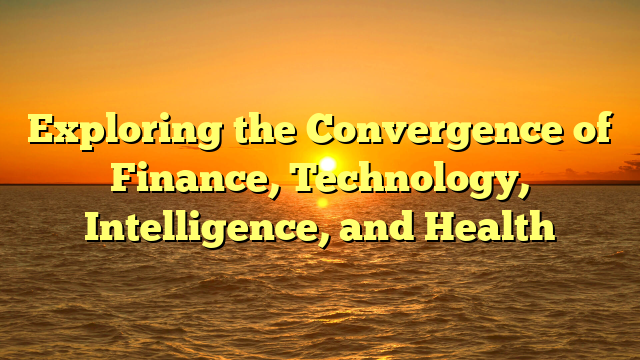In today’s rapidly changing world, the intersection of the ever-evolving fields of finance, technology, smart systems, and healthcare is creating unprecedented opportunities. These four fields, when combined, hold the potential to create sustainable futures across various sectors. This article explores how the fusion of finance, technology, intelligence, and health is leading to significant changes.
—
Finance: The Backbone of Innovation
Finance plays a crucial role in fostering innovation and growth. Conventional banking are being replaced by emerging technologies, including blockchain, cryptocurrencies, and decentralized finance (DeFi). These innovations are introducing new methods of wealth management and investment.
One notable development is the rise of cryptocurrency, which challenges traditional banking systems. Digital currencies and blockchain technologies have paved the way for the digital transformation of finance. These technologies promise faster and cheaper transactions, but they also pose challenges, including regulatory concerns and market volatility.
Furthermore, machine learning in financial services is becoming increasingly significant. AI-powered algorithms are transforming investment strategies. Financial institutions now use AI to improve fraud detection. The synergy between AI and finance is unlocking new possibilities, making financial systems smarter and more efficient.
—
Technology: The Catalyst of Change
Technology is undoubtedly the catalyst that drives progress in nearly every sector. Innovative tech like AI, machine learning, and the Internet of Things (IoT) have revolutionized the way businesses operate and individuals interact with the world. The impact of technology on the financial industry is particularly profound, enabling faster transactions, better data analysis, and more personalized services.
Machine learning has made its mark on various industries, including healthcare. In the medical field, AI is used for predicting health outcomes, optimizing treatments, and assisting in medical decisions. The ability of AI to analyze large datasets and identify patterns that may go unnoticed by humans has the potential to revolutionize patient care.
Moreover, smart devices are transforming the medical industry. Devices like wearable health monitors, connected medical devices, and remote patient monitoring systems allow healthcare providers to offer more personalized and timely care. Technology is also enabling telemedicine, which is reducing the need for in-person visits.
—
Intelligence: The Driving Force Behind Innovation
Intelligence, particularly artificial intelligence (AI), is at the core of many technological advancements. Machine learning algorithms are becoming smarter and more capable, enabling more precise decision-making across industries. From finance to healthcare, intelligence is improving efficiency.
In finance, AI is used for automating trading strategies. AI-powered systems can analyze vast amounts of data and generate insights that would be impossible for human analysts to uncover. In healthcare, AI is helping to diagnose diseases more accurately. Deep learning is also playing a role in understanding patient records and improving clinical outcomes.
The field of AI is also contributing to advancements in predictive health analytics. By analyzing genetic information and health data, AI can help doctors design tailored treatments. This personalized approach to medicine is transforming patient care, leading to better outcomes and more effective treatments.
—
Health: The Ultimate Goal of Innovation
At the core of these advancements is a shared goal: improving health outcomes and enhancing the quality of life. Advances in medical technology are enabling more accurate diagnoses, better treatment options, and healthier lifestyles. From wearable health trackers to telemedicine platforms, technology is bringing healthcare to underserved populations.
The integration of AI and data analytics in healthcare is streamlining medical research. In the financial sector, the use of AI is also improving cost prediction for treatments, which ultimately benefits patients by improving access to necessary treatments.
Early detection is another area where technology is making a significant impact. Wearable devices and health monitoring apps can track vital signs, help people manage chronic conditions. This allows for early intervention and better management of health, potentially preventing serious conditions before they develop.
—
The Future of Finance, Technology, Intelligence, and Health
The future of finance, technology, intelligence, and health is full of opportunities. As these fields continue to converge, we can expect even more groundbreaking developments. Smart healthcare technologies will continue to disrupt industries.
The role of AI in both finance and healthcare will only grow, offering more tailored solutions, smarter systems, and increased efficiency. As these technologies evolve, they will foster global collaboration in tackling health crises and financial inequities. kursi4d to harnessing this potential lies in collaborative efforts.
—
Conclusion
The convergence of finance, technology, intelligence, and health is shaping the future of our world. These fields are not only interconnected but also mutually reinforcing, creating a cycle of innovation that promises to address some of the world’s most pressing challenges. As we continue to innovate and advance in these areas, we can look forward to a future where financial systems are more efficient.
